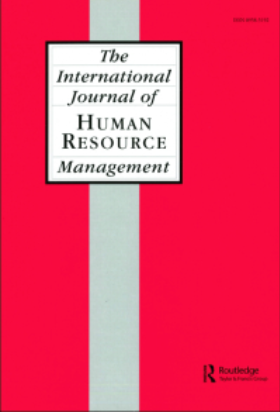Language in international human resource management: current state of research and future research directions
IF 5.9
2区 管理学
Q1 MANAGEMENT
International Journal of Human Resource Management
Pub Date : 2023-11-03
DOI:10.1080/09585192.2023.2274659
引用次数: 0
Abstract
Research on language in international business has grown substantially during the last two decades. However, research that links language to human resource management (HRM) has remained scarce. This is unfortunate because attracting, developing, motivating, and retaining a multilingual workforce is essential for the long-term success of organizations in today’s global business world. The present special issue on language in international HRM contributes to tackling this gap. We provide an overview of the current state of research on language in nternational HRM and preview the papers in this special issue. Building on and extending current knowledge, we propose future research directions in terms of 1) a nuanced understanding of HRM functions, 2) language as part of multinational diversity management, 3) consideration of different actors and different contexts, 4) robust theorizing at multiple levels, and 5) more diverse methods to capture complex realities of a multilingual workforce.国际人力资源管理语言研究现状及未来研究方向
在过去的二十年里,对国际商务中语言的研究有了长足的发展。然而,将语言与人力资源管理(HRM)联系起来的研究仍然很少。这是不幸的,因为在当今的全球商业世界中,吸引、发展、激励和留住多语言员工对组织的长期成功至关重要。当前国际人力资源管理中的语言专题有助于解决这一差距。我们概述了国际人力资源管理中语言研究的现状,并在本期特刊中预览了论文。在现有知识的基础上,我们提出了以下方面的未来研究方向:1)对人力资源管理功能的细致理解;2)语言作为跨国多元化管理的一部分;3)考虑不同的参与者和不同的背景;4)在多个层面上建立健全的理论;5)更多样化的方法来捕捉多语言劳动力的复杂现实。
本文章由计算机程序翻译,如有差异,请以英文原文为准。
求助全文
约1分钟内获得全文
求助全文
来源期刊
CiteScore
11.70
自引率
7.10%
发文量
77
期刊介绍:
International Journal of Human Resource Management is the forum for HRM scholars and professionals worldwide. Concerned with the expanding role of strategic human resource management in a fast-changing global environment, the journal focuses on future trends in human resource management, drawing on empirical research in the areas of strategic management, international business, organizational behaviour, personnel management and industrial relations that arise from: -internationalization- technological change- market integration- new concepts of line management- increased competition- changing corporate climates Now publishing twenty-two issues per year, The International Journal of Human Resource Management encourages strategically focused articles on a wide range of issues including employee participation, human resource flow, reward systems and high commitment work systems. It is an essential publication in an exciting field, examining all management decisions that affect the relationship between an organization and its employees. Features include; -comparative contributions from both developed and developing countries- special issues based on conferences and current issues- international bibliographies- international data sets- reviews

 求助内容:
求助内容: 应助结果提醒方式:
应助结果提醒方式:


